Opinion: There is no such thing as free water

'We have to conserve water, and charges are the only way to encourage that.'
The storm of late January has left many rural households still without telephone landlines and broadband. This might sound a bit like a first-world problem, but farm families rely on broadband for day-to-day operations like registering new-born calves and filling out forms, and many rural dwellers work remotely and need reliable broadband.
Driving along several back roads in the north of the county last week I was surprised to see so many phone lines still down. I spotted the occasional crew, effectively rebuilding the network over long stretches, but the task is enormous and some customers will have to wait for months before service is restored. Much of the problem stems from a lack of investment. Since Telecom Eireann was privatised, maintenance became less of a priority in the new profit-driven model. Privatising this state-owned utility was a bad idea, and the customers are now paying the price for it.
In the UK, Thames Water was privatised during the Thatcher era, and has changed hands several times since. Debt servicing and major cost-cutting has driven that company to a point where it is now on the edge of collapse with the water in some cases unfit for drinking. Privatisation of state utilities was a bad idea in Britain, and it is a bad idea here. We should learn from these and other examples, and ensure that our water supply infrastructure remains in state hands.
There is no such thing as free water. It has to be treated and purified, the resultant sewage must be treated too, and this all costs money. Opponents of water charges think they should enjoy limitless piped water paid for by the taxes of others. They cleverly conflate the very valid anti-privatisation argument with the topic of water charges, but that is a diversion. Water infrastructure must never be privatised, with a constitutional guarantee if that is really necessary, but any such guarantee must ensure that the ‘user pays’ principle can be established on the customer side of the meter. Currently, you can leave all your taps running, all the time, and nobody can charge you for it.
When metered charges were proposed in 1994 to deal with wastage, there was a predictable degree of moaning from people who don’t like to pay for anything. The government that included Michael Martin capitulated to that cohort when they didn’t need to. Over half of customers had already paid, and many of the rest were adopting a ‘wait and see’ attitude. When the subject arose again recently the same ‘no pay’ whinging quickly started, disguised as an anti-privatisation lobby, and Michael Martin appears to have surrendered again.
Our Taoiseach was undoubtedly the right man to deal with Donald Trump, but he really needs to hand this thorny issue to somebody with more steel in their spine. We have to conserve water, and charges are the only way to encourage that.





